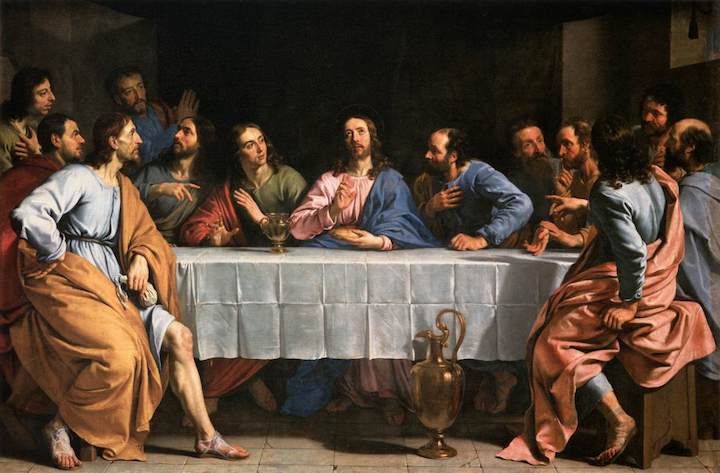The Congregation for the Doctrine of the Faith recently issued a document “On Certain Aspects of Christian Salvation.” The document, entitled Placuit Deo – “It has pleased God” – draws its title and its opening sentences from Vatican II’s “Dogmatic Constitution on Divine Revelation,” Dei Verbum.
The sentences are so rich and their implications so profound that they are worth pondering anew as we begin the Paschal Triduum on this Holy Thursday:
It has pleased God, in His goodness and wisdom, to reveal Himself and to make known to us the hidden purpose of His will, by which, through Christ, the Word made flesh, humankind might have access in the Holy Spirit to the Father and thus come to share in the divine nature. The deepest truth about God and the salvation of humanity shines out for our sake in Christ, who is both the mediator and the fullness of all revelation. (Dei Verbum, 2).
Though Vatican II issued four “Constitutions,” the documents of the Council bearing the highest magisterial authority, I have long maintained that among them, Dei Verbum provides the foundation upon which the others rest. For if God has not revealed Himself, all else – liturgy, Church order, mission – is mere human construct. And if God’s fullness does not truly shine forth in Jesus Christ, the eternal Word who has become one of us, even unto death, death on a cross, then there is no distinctive originality to Christian revelation.
This objective reality – God’s incarnate presence in the man Jesus Christ – has as its gracious purpose to bring humankind to salvation, to that unimaginable fulfillment that is a sharing in God’s very Trinitarian life. Both Dei Verbum and Placuit Deo proclaim the audacious Good News that human salvation is nothing less than theosis, deification.
One of the noteworthy features of Placuit Deo is its insistence that “the teaching on salvation in Christ must always be deepened.” Scripture and tradition abound with different images and concepts concerning salvation. Redemption and liberation, purification and healing, reconciliation and atonement, all seek to articulate different dimensions of the inexhaustible mystery. Each points to some aspect of our deep human need, our spiritual illness, and indicates the saving cure prescribed and effected by Christ, the physician of both body and soul.

But Placuit Deo is also quite realistic regarding the perennial human propensity to ignore the symptoms and deny the disease: “Seeing they do not see; hearing they do not understand.” Drawing upon terms used by Pope Francis, it speaks of a neo-Pelagianism and a neo-Gnosticism. Both heresies are ancient, yet ever new. They stem from the proud assertion of a “radical autonomy” for which “salvation depends on the strength of the individual or on purely human structures, which are incapable of welcoming the newness of the Spirit of God.”
It is this mark of “newness” that urgently needs to be recovered and underscored in our spiritual lives, our theology, our pastoral accompanying and discerning. The New Testament revels in the experience and celebration of this newness: new covenant, new Adam, new Moses, new Temple, new creation. And this newness is, of course, concentrated and recapitulated in the one Lord and Savior, Jesus Christ. In the magnificent words of Saint Irenaeus of Lyons: “Christ brought all newness in bringing himself!”
Placuit Deo breathes this Irenaean spirit when it proclaims: “The good news of salvation has a name and a face: Jesus Christ, Son of God, Savior.” And it insists that, much more than merely a model, Jesus Christ is the one “who transforms the human condition by incorporating us into a new existence.” Salvation in Christ, therefore, entails far more than an improvement of our physical or social condition, however desirable, such may be. It enters into us more deeply and radically, calling forth and enabling a new self.
It is crucial that preaching, spiritual counseling, and theology proceed from a keen sense of what the new life of the Spirit consists in and requires. Matthew 25, Galatians 5, Romans 12, Colossians 3 (among other New Testament texts) sketch the distinctive portrait. But the portrait must be appropriated and given flesh by everyone who, through baptism, has been born anew in Jesus Christ.
In face of an atomistic individualism, destructive of both community and environment, salvation in Christ is our incorporation into a new supernatural network of relations. Baptism begins our transformation from solitary individuals, whose default language is the autonomous “I,” to persons whose constitutive relations in Christ find expression in the redeemed language of “we.”
But it is the Eucharistic body of the crucified and risen Lord that establishes and effects Christ’s ecclesial body, the Church. The Eucharist literally incorporates us into a new mode of existence. Our truest identity is to be members of Christ’s body whose redeemed, Eucharistic relationships image the relations among the persons of the Trinity.
In one of his most impassioned paragraphs, then-Cardinal Joseph Ratzinger exclaimed:
The Eucharist is never an event involving just two, a dialogue between Christ and me. Eucharistic Communion is aimed at a complete reshaping of my life. It breaks up man’s “I” and creates a new “we.” Communion with Christ is necessarily also communion with all who belong to him. It means that I myself become part of the new bread that he is creating by the transubstantiation of the whole of earthly reality.
In the Eucharist, our transformation in Christ is nourished and stretched toward final transfiguration. Eucharist is the sacrament of the new creation, the fullest anticipation of that heavenly banquet when God will truly be “all in all” (1 Cor 15:28). The Eucharistic language of “we” will be the native language of the Kingdom where the full communion of humanity with the communion that is the very life of the Trinity is consummated and celebrated.
*Image: The Last Supper by Philippe de Champaigne, c. 1652 [Musée du Louvre, Paris]














